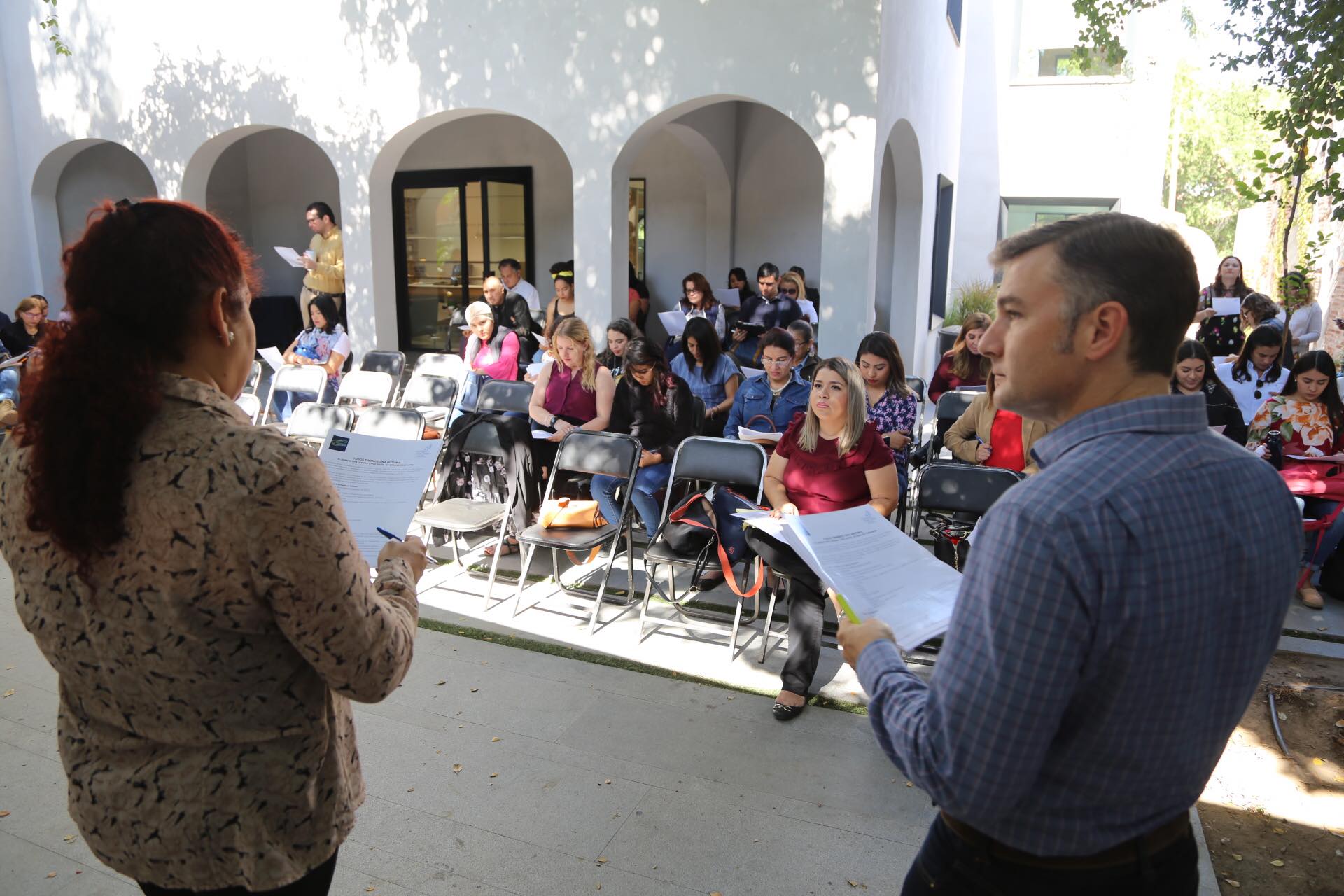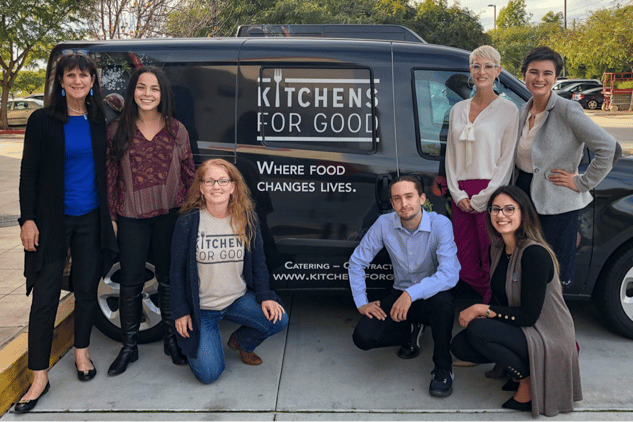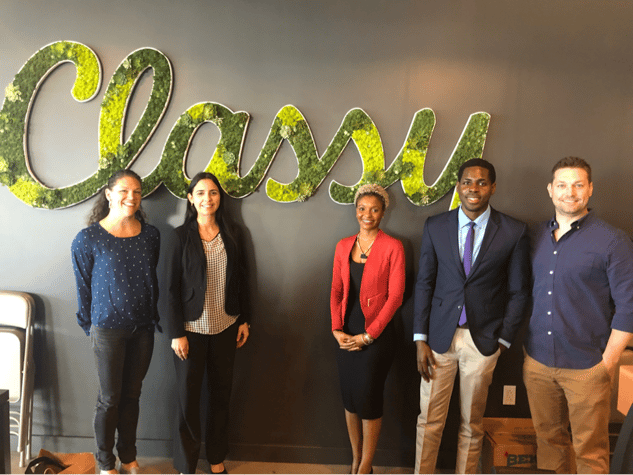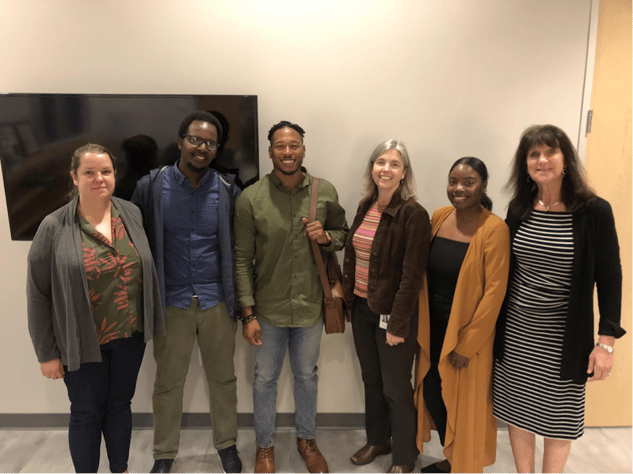MASI Teams Create Impact for Three San Diego Organizations During Winter Practicum

MASI Teams Create Impact For Three San Diego Organizations During Winter Practicum
Fundamental to becoming an effective social innovator is learning to create tangible positive change for the organizations you support.
During Intersession in January 2019, 10 Master of Arts in Social Innovation (MASI) students worked on three different consulting projects with local San Diego organizations as part of their winter practicum course taught by Kroc School Professor of Practice Karen Henken. The organizations were Kitchens for Good, Classy, and San Diego Workforce Partnership.
Leading up to the course, Professor Henken collaborated with the organizations to help each of them select a challenge they faced that would serve as the basis of the consulting project with the student teams. Each organization identified a specific social impact need or issue where the student teams could add significant value by focusing their time and talent to develop a solution during the three-week course.
The outcomes of the course and student experience resulted in outstanding work and impact as each of the three student teams created a replicable solution for their respective client organization.
Below are recaps of each of these projects from the MASI students’ perspective as well as the clients’ feedback on their respective project.
Capturing and Sharing New Stories for Kitchens for Good
Written by Patricia Cosulich and Julia Stewart, MASI 2018-19
During the Intersession term, we had the opportunity to do a consulting practicum with the incredible organization Kitchens for Good (KFG). Their mission reads, “Kitchens for Good breaks the cycles of food waste, poverty and hunger through innovative programs in workforce training, healthy food production, and social enterprise.”
KFG’s culinary training program opens future career opportunities to people re-entering society from incarceration or who have other significant barriers to employment. KFG also rescues imperfect produce that would otherwise go into landfills and produces healthy, freshly made meals for some of San Diego’s most vulnerable. On top of all that, the organization includes a social enterprise that generates revenue through its catering and event business which also provides employment to students and graduates.
Our task was to create a ‘story bank’ of sorts — a collection of perspectives and experiences from all different stakeholders including graduates, employers, meal partners, and staff. To accomplish this, we conducted and recorded interviews with key stakeholders, then turned some stories into video clips, and others into written pieces. Each story was inspirational and illuminating in its own way.
Further, we developed a comparative analysis and recommended a set of “best practices.” We learned about workforce development and were able to share with KFG how far their impact stretches. Not only were we able to create some great marketing materials for the organization, but we were also able to build important relationships in the social enterprise sector of San Diego. As MASI students, it is important for us to participate in opportunities that are practical and potentially representative of future employment, and this project enabled us to do exactly that.
After the project, we learned that our work sparked conversations at KFG about how to expand and deepen their approach to storytelling and marketing. Being able to work on a project that was full of meaning and inspiration was an invaluable experience that we will remember forever.
Aviva Paley, senior director and co-founder of KFG, provided these comments as the project concluded:
"Working with the USD MASI students was a wonderful experience. The students went above and beyond to capture our KFG students’ stories and create moving narratives about the impact Kitchens for Good has on people's lives. The material that the USD students gathered will be incredibly beneficial to our organization for future marketing, grant writing and storytelling."

Left to right: Professor Karen Henken, Kroc School; Geraldine Zamorra and Katrina Meredith, Kitchens for Good; MASI students Sebastien Orebi, Julia Stewart, Nisreen Al Sabie, Patricia Cosulich, Kroc School.
Identifying Opportunities for Event Growth for Classy
Written by Ana Dominguez, MASI 2018-19
Classy is one of America’s leading fundraising platforms trusted by over 4,000 nonprofits and social organizations including The Acumen Fund and Shriners Hospital.
My fellow MASI teammates, Kumba McGill and Momo Bertrand, and I had the opportunity to work on a project for Classy focused on The Collaborative, a three-day networking and learning event for nonprofits, hosted by Classy and scheduled to be held in Boston in June 2019.
We worked with Classy's Senior Marketing Manager Kyle Moss on a consulting project with the following goals: find engaging and creative speakers and panelists for the Collaborative; suggest creative and contemporary themes that will appeal to nonprofit audiences; run comparative analyses and recommend best practices to improve the Collaborative. We had an intense three-week timeline to perform research, conduct interviews, and develop our proposal to present to Classy.
During the final presentation, we shared our findings and recommendations with Kyle Moss and Pat Walsh, Classy’s co-founder and chief impact officer. We presented a comprehensive list of potential speakers and panelists; suggested marketing ideas, creative themes and topics to appeal to the nonprofit audience; and shared their comparative analysis of similar industry events and best practices. The project was well-received and considered a success, and we will attend The Collaborative in Boston in June. A particularly exciting development is that one of our teammates, Momo Bertrand, has been accepted as a presenter at The Collaborative, and Classy is generously sponsoring the flights and event tickets for his involvement.
Kyle Moss provided these comments as the project concluded:
“Working with the MASI USD cohort of students was inspiring and incredibly helpful! Their fresh and relevant ideas assisted greatly in ensuring our company event planning process was both diverse and timely in topic. They displayed great professionalism, were extremely thorough throughout, and maintained a high level of organization in their production of all materials. To boot, they were an overall delight to work alongside! Having met the entire class, I was inspired and motivated by their ideas and the level of innovation they all clearly possess. I'm excited to have even been able to extend an invitation to one of the amazing students to present to an audience of over 1,200 nonprofit professionals in June in Boston. Classy was extremely pleased with the results of the partnership and blown away by the level of production these students were able to achieve in such a short amount of time!"

Left to right: Kyle Moss, Classy; MASI students Ana Dominguez, Kumba McGill, Momo Bertrand, Kroc School; Pat Walsh, Classy
Designing a Workshop Promoting Dignity for San Diego Workforce Partnership
Written by Jessica Logan, MASI 2018-19
For the winter consulting project, we worked with the San Diego Workforce Partnership (SDWP), a local nonprofit. SDWP believes “in the power and dignity of work and understands that an integrated approach — which considers factors like education, child care, housing, and healthcare — is the key to empowering individuals to attain durable self-sufficiency and employers to create a stable workforce.”
They asked for our help with two requests. The first was to create a research methodology that would collect qualitative data to better understand the duration and frequency of disconnections for Opportunity Youth — young people between ages 16-24 who have had disruptions in their education and employment. The second request was that we find a way for the execution of this research method to have a positive impact on the participants. We further recognized that a ubiquitous need for nonprofits is to effectively use the time and resources available.
Through our research, we discovered that journey mapping, group discussions, and individual interviews were some of the best means of gathering this type of data. Rather than conducting this research during one-on-one interactions over a period of two weeks, we decided the best method would be to create a single three-hour workshop event in the hopes of gathering qualitative data from the largest sample in the least amount of time. It was the details in the design, which centered on promoting self-efficacy and dignity, that was of primary importance to our team. Our professor, Karen Henken, encouraged us to “put our hearts into the design process.”
Our goal was to curate a workshop to meet the needs of our client and the participants. Employing human-centered design practices and concepts of mindfulness, positive psychology, and design thinking, every detail of the workshop intended to build participants’ recognition of their inherent dignity and potential for success. We consulted design thinking expert J.C. Rivas, associate director of USD’s Changemaker Hub, and also got input from the SDWP Opportunity Youth Leadership Council.
Ultimately, the workshop portfolio package we designed enables SDWP to execute a research methodology that connects participants to their past in a way that highlights their strengths and skills rather than their struggles. This approach helps them to draw from those positive reflections to shape their future career and education goals.
We were able to execute a pilot workshop that administered a feedback survey at the end, and results from respondents were positive across the board. In addition to this key deliverable, we included a digital booklet and video of the workshop experience to share with participants.
The best part of the workshop experience was our ability to connect with Opportunity Youth and be a force for empowerment in their lives because joy comes both from the community we can help and the community we create.
Laura Kohn, Director of Marketing at SDWP, provided these comments as the project concluded:
“The students helped us bring an idea we had to life. They learned about our work with Opportunity Youth quickly, and they asked lots of smart questions along the way. And they ended up developing a prototype we are excited to build on, which is a terrific outcome.”

Left to right: MASI students Jessica Logan and Jean Paul Mugarineza, Kroc School; Eric Morrison Smith and Laura Kohn, San Diego Workforce Partnership; Professor Karen Henken, Kroc School
Ready to advance your journey as a social innovator? Learn more about the Kroc School's Master of Arts in Social Innovation.
Contact:
Justin Prugh
jprugh@sandiego.edu
(619) 260-7573

About the Author
The Joan B. Kroc School of Peace Studies (Kroc School) at the University of San Diego is the global hub for peacebuilding and social innovation. Founded in 2007, the Kroc School equips the next generation of innovative changemakers to shape more peaceful and just societies. We offer master's degrees in peace and justice, social innovation, humanitarian action, conflict management and resolution, and a dual degree in peace and law — programs that have attracted diverse and dynamic students from more than 50 countries. In addition to our graduate programs, the Kroc School is home to the Kroc Institute for Peace and Justice (Kroc IPJ). Founded in 2001, the Institute supports positive change beyond the classroom. Through groundbreaking research, experiential learning, and forward-thinking programs, the Kroc School and Kroc IPJ are shaping a future in which peaceful co-existence is the new normal.





